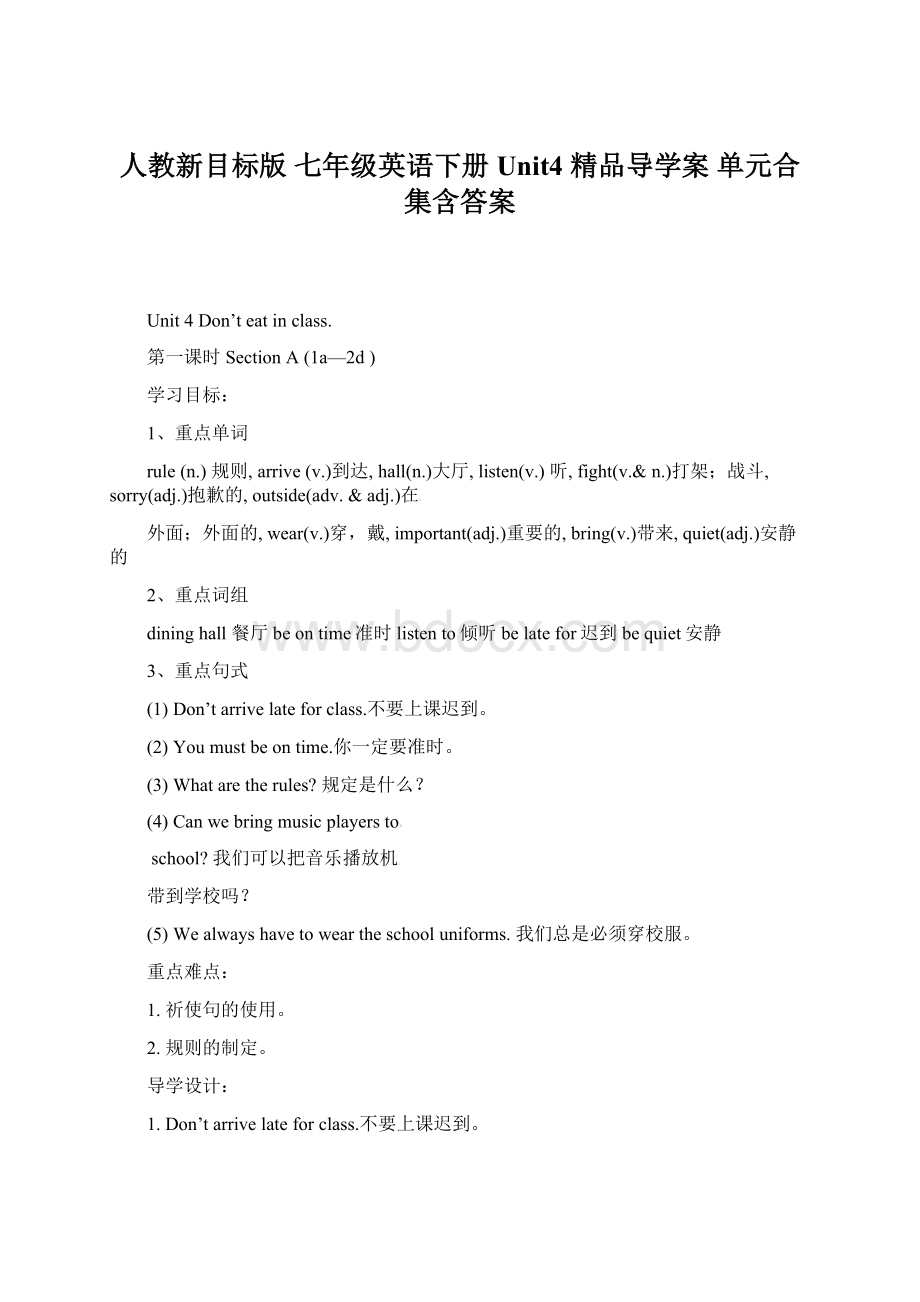人教新目标版 七年级英语下册 Unit4 精品导学案 单元合集含答案.docx
《人教新目标版 七年级英语下册 Unit4 精品导学案 单元合集含答案.docx》由会员分享,可在线阅读,更多相关《人教新目标版 七年级英语下册 Unit4 精品导学案 单元合集含答案.docx(16页珍藏版)》请在冰豆网上搜索。

人教新目标版七年级英语下册Unit4精品导学案单元合集含答案
Unit4Don’teatinclass.
第一课时SectionA(1a—2d)
学习目标:
1、重点单词
rule(n.)规则,arrive(v.)到达,hall(n.)大厅,listen(v.)听,fight(v.&n.)打架;战斗,sorry(adj.)抱歉的,outside(adv.&adj.)在
外面;外面的,wear(v.)穿,戴,important(adj.)重要的,bring(v.)带来,quiet(adj.)安静的
2、重点词组
dininghall餐厅beontime准时listento倾听belatefor迟到bequiet安静
3、重点句式
(1)Don’tarrivelateforclass.不要上课迟到。
(2)Youmustbeontime.你一定要准时。
(3)Whataretherules?
规定是什么?
(4)Canwebringmusicplayersto
school?
我们可以把音乐播放机
带到学校吗?
(5)Wealwayshavetoweartheschooluniforms.我们总是必须穿校服。
重点难点:
1.祈使句的使用。
2.规则的制定。
导学设计:
1.Don’tarrivelateforclass.不要上课迟到。
【归纳】
(1)arrivelatefor与belatefor同义,都表示“”。
arrivelatefor侧重到达的十件晚,belatefor侧重状态。
例如:
Don’tarrivelateforthemeetingnexttime.=Don’tbelateforthemeetingnexttime.下次开会别迟到。
(2)区分ar
rive,reac
h与get
arrive意为“到达”,是不及物动词,后接a
t加小地点;后接in加大地点。
reach意为“到达”,是及物动词,后接表示地点名词。
get意为“到达”,是不及物动词,后接to,再加表示地点的名词。
2.Canwebringmusicplayerstoschool?
我们可以把音乐播放机带到学校吗?
【归纳】
(1)本句是含有情态动词的一般疑问句,can在此处表示许可,意为“”。
肯定回答用“Yes,…can.”;否定回答用“No,…can’t.”。
例如:
Wecan’tlistentomusicinthehallways.我们不能在走廊里听音乐。
【拓展】can还有以下用法:
①表示能力,意为“能会”。
例如:
WecanspeakalittleEnglish.我们会说一点英语。
②表示请求,用于疑问句,could比can更委婉。
例如:
CanIhelpyou?
我可以帮你吗?
(2)区分bring,take与carry
bring意为“”,指从别处带到说话者所在的地方。
例如:
Pleasebringyourexercisebookheretomorrow.请明天把你的练习本带这儿来。
take意为“带走;拿走”,指从说话地方带到远处,常与介词to连用,与bring方向相反。
例如:
Canyoutakethebookstotheclassroom?
你能把这些书带到教室?
carry意为“搬运”,无方向性。
例如:
Theboxistooheavytocarry.这箱子太重,搬不动。
3.Sorry,Ms.Clark.对不起,克拉克夫人。
sorry意为“”,用于表达歉意。
与之相比较,excuseme意为“对不起,打扰一下”,是打扰别人时与别人打招呼的用语。
I’msorry.Ibrokeyourcup.对不起,我打碎了你的杯子。
Excuseme,canyouhelpme?
对不起,你能帮我一下吗?
知识巩固:
Ⅰ.根据汉语或首字母提示写单词。
1.Everyonemustfollowtheschoolr
.
2.Studentscan’tlistentomusicinclass,buttheycanlistentoit(在外面)inNo.2MiddleSchool.
3.Ourschool
hasanewdiningh.Weliketoeatthere.
4.Youcan’twthiskindofhatsinschool.
5.Childrenoften(打架)forsometoysorstorybooks.
Ⅱ.单项选择
1.Tom,don’talwaysfightyourclassmates.
A.to
B.inC.atD.with
2.Alanthemeeting.
A.isn’tarrivelateforB.doesn’tlateforC.islateforD.arrivelatefor
3.PleasemyEnglishbook
here.I
needit.
A.takeB.bringC.totakeD.tobring
4.---Ifinishmyhomeworknow?
---No,you.Yourworkisovertoday.
A.Can;mustB.Must;don’thavetoC.May;couldn’tD.Couldn’t;could
5.---Don’ttakepictureshere,please.
---.
A.NowayB.Sorry,Iwon’tC.HereyouareD.It’spleasure
Ⅲ.根据汉语意思完成句子
1.我们必须准时到达学校。
Wegettoschool.
2.不准在走廊上奔跑。
runinthe.
3.你不可以在教室听音乐。
Youcan’tmusicintheclassroom.
4.在图书馆我们应该保持安静。
Weshouldinthelibrary.
5.学好英语很重要。
ItislearnEnglishwell.
6.你能把收音机带到这儿来吗?
youyourradiohere?
7.这是我上学的第一天。
Thisismyatschool.
8.你可以在外面听音乐。
Youcantomusic.
参考答案
导学设计
1.
(1)做某事迟到2.
(1)可以
(2)带来,拿来3.对不起
知识巩固
Ⅰ.1.rules2.outside3.hall4.wear5.fights
Ⅱ.1-5DCBBB
Ⅲ.1.must,ontime
2.Don’t,hallways3.listento4.keepquiet5.importantto6.Can,bring7.firstday8.listen,outside
Unit4Don’teatinclass.
第二课时SectionA(GrammarFocus-3c)
学习目标:
1、重
点单词
rule规则
2、重点词组
wearahat戴帽子wearauniform穿校服bequiet保持安静
3、重点句式
(1)Don’truninthehallways.不要在走廊里跑。
(2)---Whataretherules?
规则是什么?
---Wemustbeontimeforclass.我们必须准时上课。
(3)---Canweeatintheclassroom?
我们能在教室里吃东西吗?
---No,wecan’t,butwecaneatinthedininghall.不能,但是我们可以在餐厅里吃东西。
(4)---Doeshehavetowearauniformatschool?
他在学校必须穿校服吗?
---Yes,hedoes./No,hedoesn’t.是的。
/不,不是。
(5)---Whatdoyouhavetodo?
你必须做什么?
---Wehavetobequietinthelibrary.我们在图书馆必须保持安静。
重点难点:
1.祈使句的使用
2.情态动词的使用
导学设计:
1.Don’truninthehallways.不要在走廊里跑。
【归纳】祈使句是用来表示请求、命令、叮嘱、号召或者劝告等的句子,这类句子的主语常是第二人称you,也就是听话者,因而you常省去了。
祈使句的开头是动词原形。
可在句首或句末加上please,若在句末加please,之前要用逗号隔开。
祈使句有肯定祈使句与否定祈使句两种。
祈使句的否定形式多以do not(常缩写成don’t)开头,再加上。
Listentomusicoutside.
Don’tlistentomusicouts
ide.
(1)肯定祈使句的常见句型结构:
①Do型:
动词原形+宾语+其他.如:
Openthedoor,please.
②Be型:
Be+表语.如:
Beagoodboy!
③Let型:
Let+宾语+动词原形+其他.
(或:
Let’s+
动词原形+其他.)如:
Letmehelpyou.
又如:
Let’splaytennis.
(2)否定祈使句的常见句型结构:
①Do型和Be型的否定式:
Don’t+动词原形/be+其他.如:
Don’tforgetme.又如:
Don’tbelate.
②Let型的否定式:
Don’t+let+宾语+动词原形+其他.(或:
Let’s+not+动词原形+其他.)如:
Don’tlethimgoback.又如:
Let’sno
tgoswimming.
③警示语:
No+名词/动词-ing形式.如:
Notalking.
2.Wemustbeontimeforclass.我们必须准时上课。
ontime意为“”。
含time的短语还有intime意为“及时”,attimes意为“有时”,fromtimetotime意为“不时,时常”。
Healwaysgetstotheofficeontime.他总是准时到达办公室。
Theysenttheboytothehospitalintime.
他们及时送孩子去了医院。
3.Wehavetobequietinthelibrary.我们在图书馆必须保持安静。
haveto意为“必须,不得不”,后接动词原形
,表示条件下“必须做某事”。
haveto有第三人称单数形式,即hasto,变疑问句和否定句要用助动词do/does。
must意为“必须”表示主观条件下“不得不”。
例如:
It’sgettingdark.Ihavetoleavenow.天变得越来越黑了,我得走了。
Youmustfollowtherules
intheschool.你一定要遵守学校的纪律。
知识巩固:
Ⅰ.用所给单词的适当形式填空。
1.Don’t________(listen)tomusicinthelibrary.
2.Dowehaveto________(clean)theroomevery
day?
3.Youcan’t________(wear)sunglassesintheclassroom.
4.Please________(arrive)atschoolontime(准时).
5.Johnisoftenlatefor_______(class).
Ⅱ.将下面的句子改为祈使句,每空一词。
1.Youcancomein.
__________,please.
2.Icanhelpyou.
_____me______you.
3.Youcan’teatinclass.
____________inclass.
4.Youcan’tbelateforschool.
__________lateforschool.
5.Youcan’ttakephotoshere.
____photoshere.
Ⅲ.根据句意,选用can,can't,must,haveto或hasto填空。
1.Alice_______doherhomework,soshegoestoaskherteacherforhelp.
2.Youdon't________cleanyourroomtoday.
3.—________JimspeakEnglish?
—No,hecan't.
4.—________IhelphimwithChinese?
—Yes,youmust.
5.—WhatdoesLily________dointheevening?
—She________doherhomework.
Ⅳ.单项选择。
1.________listentomusici
ntheclassroom.
A.NotB.NoC.Don't
2.Tom,please________theclassroomnow.
A.cleanB.tocleanC.cleans
3.Let's________ontimeforclasses.
A.beB.benotC.are
4.Shehasto________herhom
eworkeverynight.
A.doesB.doC.doing
5.Sorry,you________playbasketballintheclassroom.
A.can'tB.don'tC.don'thaveto
参考答案
导学设计
1.动词原形2.准时3.客观
知识巩固
Ⅰ.1.listen2.clean3.wear4.arrive5.class
Ⅱ.1.Comein2.Let,help3.Don’t,eat4.Don’tbe5.No
Ⅲ.1.can’t2.haveto3.Can4.Must5.haveto,hasto
Ⅳ.1-5CAABA
Unit4Don’teatinclass.
第三课时SectionB(1a—2c)
学习目标:
1、重点单词
out(adv.)外出practice(v.&n.)练习dish(n.)碟,盘before(adv.)在……以前dirty(adj.)脏的kitchen(n.)厨房more(adj.
&pron.)更多(的)noisy(adj.)吵闹的relax(v.)放松read(v.)阅读terrible(adj.)可怕的feel(v.)感受strict(adj.)严格的remember(v.)记住follow(v.)跟随luck(n.)幸运
2、重点词组
goout外出dothedishes清洗餐具ma
keone’sbed铺床bestrictwithsb对某人严格要求
remembertodosth.记得去做某事followtherules遵守规则
3、重点句式
1.Therearetoomanyrules!
有太多的规矩!
2.Don’tleavethedirtydishesinthekitchen!
不要把脏盘子留在厨房里!
3.Ican’trelaxeither.我也不能放松。
4.Theymakerulestohelpyou.他们制定规则来帮助你。
5.Wehavetofollowthem.我们必须遵守它们。
6.Mollyhavetodoherhomeworkfirstwhenshegetshome.当Molly回到家,她必须做作业。
重点难点:
(1)陈述家里规则以及带给自己的感受;
(2)给身处焦虑的朋友解疑答惑。
导学设计:
1.Therearetoomanyrules.有太多的规矩。
【归纳】toomany意为“”后接可数名词复数。
Therearetoomanypeopleintheshoppingcenter.在购物中心有太多的人。
区别toomany,toomuch与muchtoo
toomuch意为“太多”,后接不可数名词。
WatchingtoomuchTVisbadforyourhealth.看太多的电视对身体健康有害。
muchtoo意为“太”,后接形容词或副词原形。
Thewashingmachineismu
chtooexpensive.这台洗衣机太贵了。
2.Don’tleavedirtydishesinthekitchen.不要把脏的盘子留在厨房里。
【归纳】leavesth+地点意为“”。
Don’tleavechildathomealone.不要把孩子单独留在家里。
3.ImustreadabookbeforeIcanwatchTV.我看电视前必须看一本书。
【归纳】must意为“”,表示主观的义务和必要,后接动词原形,无人称和数的变化。
由must引导的疑问句肯定回答要用must,否定回答用needn’t或don’t/doesn’thaveto,意为“不必”。
must的否定形式mustn’t表示禁止,意为“不能,不许”。
例如:
---MustIfinishmyhomeworkbeforesixthirty?
---Yes,youmust./No,youneedn’t./No,youdon’thaveto.是的,你必须完成。
/不,你不必。
Peoplemustn’tcrosstheroadwhentheredlightison.当红灯亮时,人们一定不要穿过马路。
4.Ihavetogotobedbefore10:
00.在10点前我必须上床睡觉。
【归纳】haveto意为“不得不,必须”,表示客观需要做的事情,后接动词原形。
havet
o有人称、数和时态的变化,其第三人称单数形式为,过去式为hadto,变疑问句或否定句时需借助助动词do/does/did。
例如:
Hehastofinishhishomeworkontime.他必须准时完成他的作业。
Youdon’thavetogettoworktoday.你今天不必去上班。
Dot
heycomehere?
他们来这儿吗?
5….butremember,theymakerulestohelpus
.但是记住,他们制定规则来帮助我们。
【归纳】remember意为“”,短语remembertodosth.意为“记着要去做某事”,rememberdoingsth.意为“记得做过某事”。
Remembertoturnoffthelightswhenyouleavetheroom.当你离开房间时记着关灯。
Iremembermeetingyouintheshoppingcenter
.我记得在购物中心见过你。
知识巩固:
Ⅰ.单项选择。
1.Ihavetogotobed9o'clock.
A.byB.toC.
onD.in
2.Wecan'tlateforclass.
A.gettoB.arriveatC.arrive
3.Thetrafficaccidenthappenedacoldmorning.
A.
inB.onC.at
4.
Thispicturemeans"".
A.Hecan'tswim
.B.Notswim.C.Noswimming
5.Ginaoftenhelpshermother________thedishes.
A.doB.doesC.doing
6.—_________youhavetowearahattoday?
—No,wedon’t.
A.AreB.CanC.Do
Ⅱ.句型转换,改同义句。
1.WemustwearuniformsonMonday.(改为同义句)
We____________wearuniformsonMonday.
2.Shehastogetupatsixo’clockeverymorning.(改为否定句)
She____________________getupatsixo’clockeverymorning.
3.IhavetopracticemyviolinonSundays.(对划线部分提问)
______________youhavetopracticeyouviolin?
4.late,can’t,arrive,for,we,school(连词成句)
________________________________________.
5.Thereisonethingyoucando.(改为复数形式)
There____________________youcando.
Ⅲ.根据汉语完成句子
1.在上学日的晚上戴夫外出吗?
Daveonschoolnights?
2.不要把脏碗留在厨房!
Don’tthedirtydishesthekitchen.
3.晚饭后我也不能放松。
Ican’trelax.
4.看电视前我必须读书。
IreadabookIcanwatc
hT